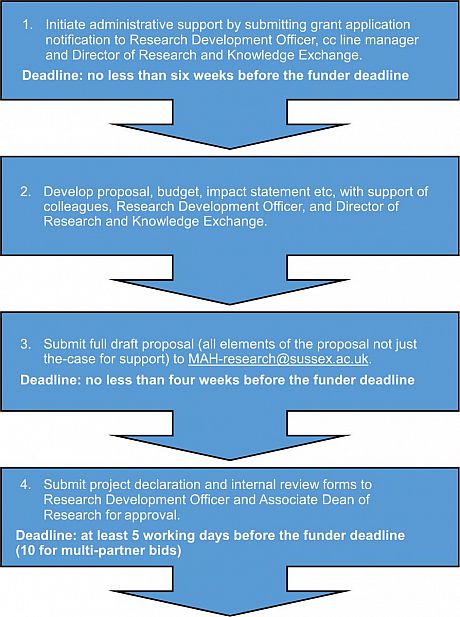Research Grant Funding Procedure
- External Research Funding Procedure
-
Media, Arts and Humanities grant application procedure
This section sets out the procedures for grant applications to external funders. These procedures are intended to be as light-touch as possible while also ensuring the quality of bids.
Both Media, Arts and Humanities and the University provide support for the internal approval processes.
Lizzie Thynne as Director of Research and Knowledge Exchange (DRKE) oversees grant applications and can provide advice on early stage ideas and also help with developing bids. You can find general advice on possible funding sources. There is also very useful advice on grant programmes relevant to Media, Arts and Humanities on the Research and Enterprise Services webpages.
Key stages of application procedure

Detailed outline of application procedure
1. Initiate administrative support by submitting grant application notification
External research funding applications must come through the Research and Enterprise Services office. Applications from Media, Arts and Humanities are handled by Sarah Frisby-Osman our Research Development Officer (RDO).
Once you have a project idea and have identified a funder please submit a grant application notification proforma to our RDO, copying in the DRKE (Lizzie Thynne) and your line manager. This form must be submitted at least six weeks* before the funder’s deadline (the only exception being when the time from call to deadline is less than six weeks). The earlier you get in contact with the RDO the greater your chance of success.
This gives the RDO advance notice that you intend to submit a bid and enables your line manager to consider any teaching implications of the grant. It is important that you discuss any requests for teaching relief with your line manager at an early stage. For joint bids with external applicants, please follow the timescales below as closely as possible. The School will seek to be flexible, with the caveat that all bids must be adequately reviewed to ensure quality and address planning implications, including teaching cover.
*Please note that since January 2021 we have been using a different system for applications for the Leverhulme Trust Research Fellowships. For these grants, applicants need to get pre-approval in February.
2. Develop proposal with advice and support from Media, Arts and Humanities
As you develop your proposal, you are encouraged to draw on from advice from colleagues (critical friends) in order to make your initial proposal as strong as possible and increase its chances of success. This is especially important for researchers with relatively limited experience of making funding applications. Informal peer advice is an excellent way of strengthening bids. The DRKE can provide advice and feedback on draft proposals. You are encouraged to discuss your ideas and show early drafts to them for comment.
The RDO is responsible for advising on the preparation of applications for research funding, ensuring that they meet the funder’s criteria and are properly costed and priced, for approving applications, and for checking, re-negotiating, and accepting awards. Please see the timeline for support here. The RDO also manages the University authorisation process for applications to external funders (see below).
The University Research and Enterprise Services pages contain useful advice on research support, research ethics, impact, and other issues.
3. Internal review of applications
If your bid value is £10,000 or over it must be reviewed and approved by the School Peer Review College (PRC). For bids below £10,000 this is not required but is still encouraged. The PRC comprises faculty who have had success applying for grants from a wide range of funding bodies. Your proposal should be submitted to MAH-research@sussex.ac.uk where it will be matched to two reviewers from the PRC panel: one from your subject area, and one with expertise of the funding body you are approaching. Please can sure that your proposal is sent to the above email address at least four weeks before the funder deadline.
The PRC will review the proposal and inform the RDO when they have done so.
This stage is not intended to hinder applications, but to ensure their quality. So long as reviewers are given sufficient notice, internal review provides an opportunity to strengthen the bid.
4. Sussex authorisation of applications to external funders
The authorisation process for research and knowledge exchange activity is the same across the University and is operated through Research and Enterprise Services. All proposals need the agreement of each investigator’s Associate Dean of Research (ADR) and may also require the relevant Pro-Vice-Chancellor’s and VCEG’s agreement, depending on the assessed level of risk involved.
The RDO instigates this process at least five working days (ten working days for multi-partner bids) before the funder’s deadline in order to allow the ADR / DRKE, the school finance office and Research and Enterprise Services sufficient time to sign-off on the bid. The RDO will report on the internal review to the authorising signatories.
Outcome of applications
Once you hear about the outcome of your application please inform the RDO and the DRKE including any reviewer and financial information. Post-outcome discussions of unsuccessful proposals are a central part of applying for grants. Not getting a grant can be deflating. We want to support you in reimagining your proposal and regaining your enthusiasm for the project. Contact your DRKE for a meeting.
Ethical review
If your bid is successful it may require ethical review before the project can begin. Details on how to do this can be found here.
Forms
- Sussex Research Funding Schemes
-
For applications to the Sussex Research Schemes which require a support statement from the Director of Research and Knowledge Exchange, please allow at least 7 days before deadline. You are encouraged to share drafts of the applications with your colleagues to ensure quality.

